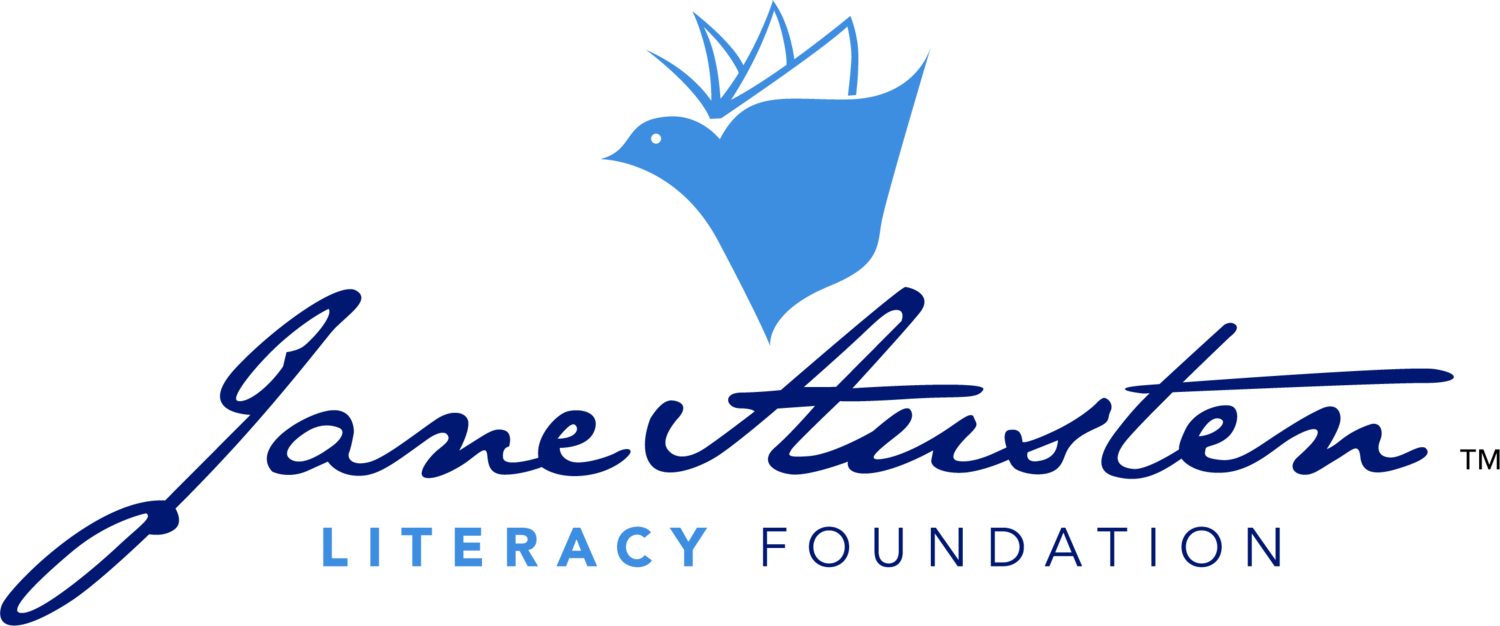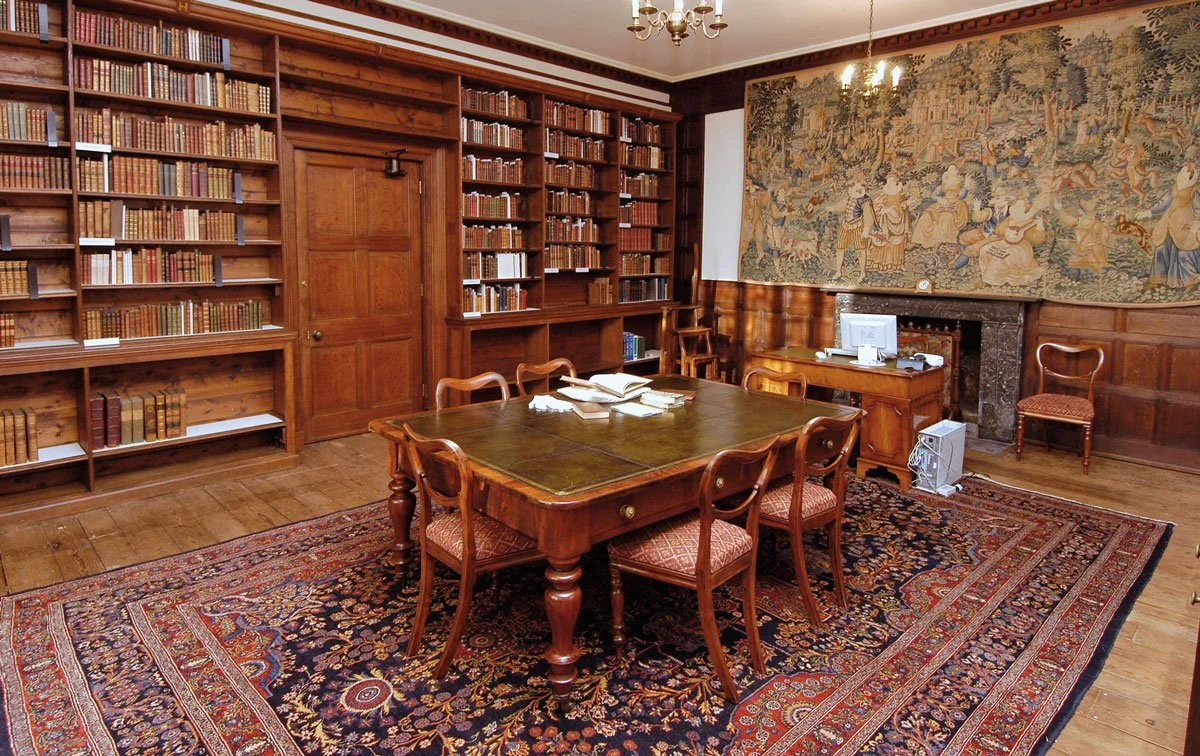“AUSTEN’S ADMIRABLE FEMALE CHARACTERS PURSUE KNOWLEDGE AND READ FOR THEMSELVES.”
Author Heather Moll explores women’s education in Austen’s works in comparison with the norms of the Regency era.
I write romantic variations of Austen’s novels, and in my Austen-inspired fiction, I can’t avoid addressing how little agency women had in the early nineteenth century. I thought since the Jane Austen Literary Foundation aims to connect through literacy, and that since nearly two-thirds of children lacking literacy skills are girls, it might be interesting to contemplate Austen thoughts about female education.
During Austen’s lifetime, there were limited opportunities for women of her social class to learn anything beyond what would make them an appealing hostess and wife. The focus of female education was not on knowledge, citizenship, or training for a career, but on things like art, music, household management, and comportment. However, Austen’s novels open a discussion on women’s education by exposing the gap between the mere “accomplishments” that women were expected to display and both a deeper intellectual understanding and richer inner life.
Overall, Austen’s own education was undertaken informally at home. Reverend Austen taught young men who were preparing for their own higher education, and his daughters had full access to the library. We know the family subscribed to lending libraries and encouraged all their children to read and write. Austen mentions many works she read in her letters, and from the Chawton House library catalog we know more works she could have read as an adult.
The Lower Reading Room at Chawton House, credit Chawton Website
In Austen’s time, the nature and purpose of women’s education was being debated, but it still had its foundation in morality, domesticity, and ornamental accomplishments. In John Gregory’s epistle, A Father’s Legacy to His Daughters, he writes:
Be even cautious in displaying your good sense. It will be thought you assume a superiority over the rest of the company—but if you happen to have any learning, keep it a profound secret, especially from the men, who generally look with a jealous and malignant eye on a woman of great parts, and cultivated understanding.
There were women like Hannah Moore and Maria Edgeworth who condemned the narrow limits of female education, but submissiveness to a husband and getting married was still the assumed end goal. Austen’s letter to her niece Fanny Knight in 1817 she laments the likelihood of her marrying and losing part of herself, “Oh, what a loss it will be when you are married! You are too agreeable in your single state—too agreeable as a niece. I shall hate you when your delicious play of mind is all settled down in conjugal and maternal affections.”
Two women at a pianoforte c. 1800
While Austen’s letter hints at her thoughts on the expectation of women’s roles, I think Austen’s novels give us her true commentary on women’s education. Her heroines’ personalities and backgrounds come through by what she tells us about their education and accomplishments. Austen never disdains typical female talents, but on their own these qualities never lead her female character to further her intellectual or emotional growth. Her admirable female characters pursue knowledge and read for themselves, while the ridiculous ones focus on ornamental accomplishments or have no true wisdom of their own.
Austen’s unfinished Sanditon gives a scathing look at the fashionable education available to some women. The Miss Beauforts arrive with Miss Lambe under the care of Mrs. Griffiths, who cared for “young ladies as wanted either masters for finishing their education or a home for beginning their displays.” They are “very accomplished and very ignorant” and aim to captivate men wealthier than they are.
Mansfield Park is in some ways a novel about education. Maria and Julia Bertram dislike young Fanny Price because she can’t speak French or appreciate their music, but once grown up and it comes time to make a crucial moral decision, it’s Fanny who succeeds. The Bertram parents neglected their girls’ education, centering primarily on rote recitation. They could “repeat the chronological order of the kings of England, with the dates of their accession, and most of the principal events of their reigns” but they didn’t even keep up their interest in art or music as they aged. The transparencies and instruments are acquired social graces but ultimately neglected.
Maria (front) and Julia (back) Bertram, Mansfield Park 2007
While Maria and Julia had a governess and masters, Edmund, who made reading “useful” to Fanny by “talking to her of what she read,” encouraged her intellect. Fanny has no inclination toward music or art, but she follows her own curiosity. Around the age that Maria and Julia have abandoned their education, Fanny is still reading what interests her, like Lord Macartney’s accounts of China. Maria marries Mr. Rushworth without loving him and then cheats on her husband, and Julia elopes for the sake of marrying before her sister’s scandal breaks. Fanny’s moral judgement is consistently sound. Austen might ask us, who is the better educated woman? One who can recite the kings of England or one who can incorporate what they learned into their knowledge?
Mary Bennet is an example of the failure of the latter. She wants to be an intellectual, but during Lydia’s crisis she parrots inappropriately from Evelina about the fragile beauty of a woman’s reputation. How is this helpful or even kind? Mary has memorized some quotes, but she parades them without understanding them.
Mary Bennet (right) and Jane Bennet (left), Pride and Prejudice 1995
In Sense and Sensibility, Charlotte Palmer “spent seven years at a great school in town,” but can’t hold a conversation or even embroider anything well. But in the Dashwood household, emphasis was placed on reading and music. Elinor manages the household and Marianne has a knack of “finding her way in every house to the library.”
A parallel for Miss Beaufort and Miss Letitia Beaufort from Sanditon could be Mrs. Hurst and Miss Bingley from Pride and Prejudice, with their seminary education and shallow values. While at Netherfield, Miss Bingley calls attention to Elizabeth choosing to read rather than play cards.
“Miss Eliza Bennet,” said Miss Bingley, “despises cards. She is a great reader, and has no pleasure in anything else.”
“I deserve neither such praise nor such censure,” cried Elizabeth; “I am not a great reader, and I have pleasure in many things.”
Elizabeth Bennet, Pride and Prejudice 1995
Is Elizabeth indignant at the accusation, or is she hiding what she knows because that’s what many people expected a woman to do? Is she being cautious to hide from the Netherfield party any reading she undertook for herself?
If she was keeping her learning “a profound secret” as John Gregory suggests, it was ultimately unnecessary because Darcy—with his generational library and who is always buying books—is a man who admires a woman who improves her mind.
The well-educated Austen heroine is not the one who can speak French and net purses. It’s the woman who has the intellectual skills to examine her own heart and her own failings. They understand themselves in order to understand others, and therefore find happiness—and this isn’t a skill learned in a fine seminary.
Anne Elliot remarks in Persuasion that “men have had every advantage of us in telling their own story. Education has been theirs in so much higher a degree; the pen has been in their hands.” Austen might give us a hint at what she thinks about men always having the educational advantage: Captain Wentworth drops his pen after Anne makes this observation to Captain Harville. It could be coincidence or irony, but this scene was written by an author, a woman, who was aware of the inadequacies and the inequalities in female education.
Austen’s novels show us she valued a literary education and believed women could and should read, write, and study. They could improve themselves if they chose. In Mansfield Park, Mrs. Norris says, “Give a girl an education, and introduce her properly into the world, and ten to one but she has the means of settling well, without farther expense to anybody.” There is some truth to that even today. Not that the goal should ever be marriage, but that girls need the means to make something of themselves. Girls need an education to engage in better decision making about themselves, about marriage, about household management, about employment, about their community. Education for girls leads to their autonomy and helps them to take part in society at large. While girls’ access to education has increased and improved since Austen’s day, there are regions of the world where it hasn’t reached parity with boys. The Jane Austen Literacy Foundation connects a world-wide grass roots community of people who believe in the power of literacy and want to help those who need it. I’d like to think Austen would have heartily approved of the Foundation’s goals.
©️Heather Moll 2022.
Heather Moll writes romantic variations of Jane Austen's classic novels. She is an avid reader of mysteries and biographies with a masters in information science. She found Jane Austen later than she should have and made up for lost time by devouring her letters and unpublished works, joining JASNA, and spending too much time researching the Regency era. She is the author of An Appearance of Goodness, An Affectionate Heart, Nine Ladies, and His Choice of a Wife. She lives with her husband and son, and struggles to balance all the important things, like whether to buy groceries or stay home and write.
Works Cited:
Austen, Jane. Mansfield Park. 1814
— Persuasion. 1817.
— Pride and Prejudice. 1813.
— Sanditon. 1817
— Sense and Sensibility. 1811.
Austen, Jane, and Vivien Jones. “To Fanny Knight Thursday 20-Friday 21 February 1817.” Letter. In Jane Austen: Selected Letters, 202. Oxford: Oxford University Press, 2005.
Gregory, John. “Conduct and Behavior.” Chapter. In A Father's Legacy to His Daughters. under the Following Heads. Introduction, Religion, Conduct, Behaviour, Amusements, Friendship, Love, and Marriage., 31–32. London: Printed by A. Millar, W. Law, & R. Cater, 1788.
Get your party pack and host a fun Christmas themed tea
Sign up for your party pack, with exclusive Jane Austen family recipes, games and activities, hosting guide, editable templates, playlist, and more... everything you need to host a Jane Austen Tea for Literacy.
Play Jane Austen and literacy games and enter the prize draw for your chance to WIN!
Georgian Sisters are launching their brand new Jane Austen Shop!
The perfect Jane Austen and Regency themed Christmas gifts, cards, and stationery
Worldwide delivery
Unique, useful, eco-friendly designer products you’ll love!
SPECIAL OFFERS
for Jane Austen Literacy Foundation friends and followers:
10% off any purchase before the 31st of December with code: JALFXMAS22
Order the 2023 Jane Austen Year Calendar before December 31st and 50% of the profits will go to the Jane Austen Literacy Foundation
Your Christmas gift will buy someone else the gift of literacy!










